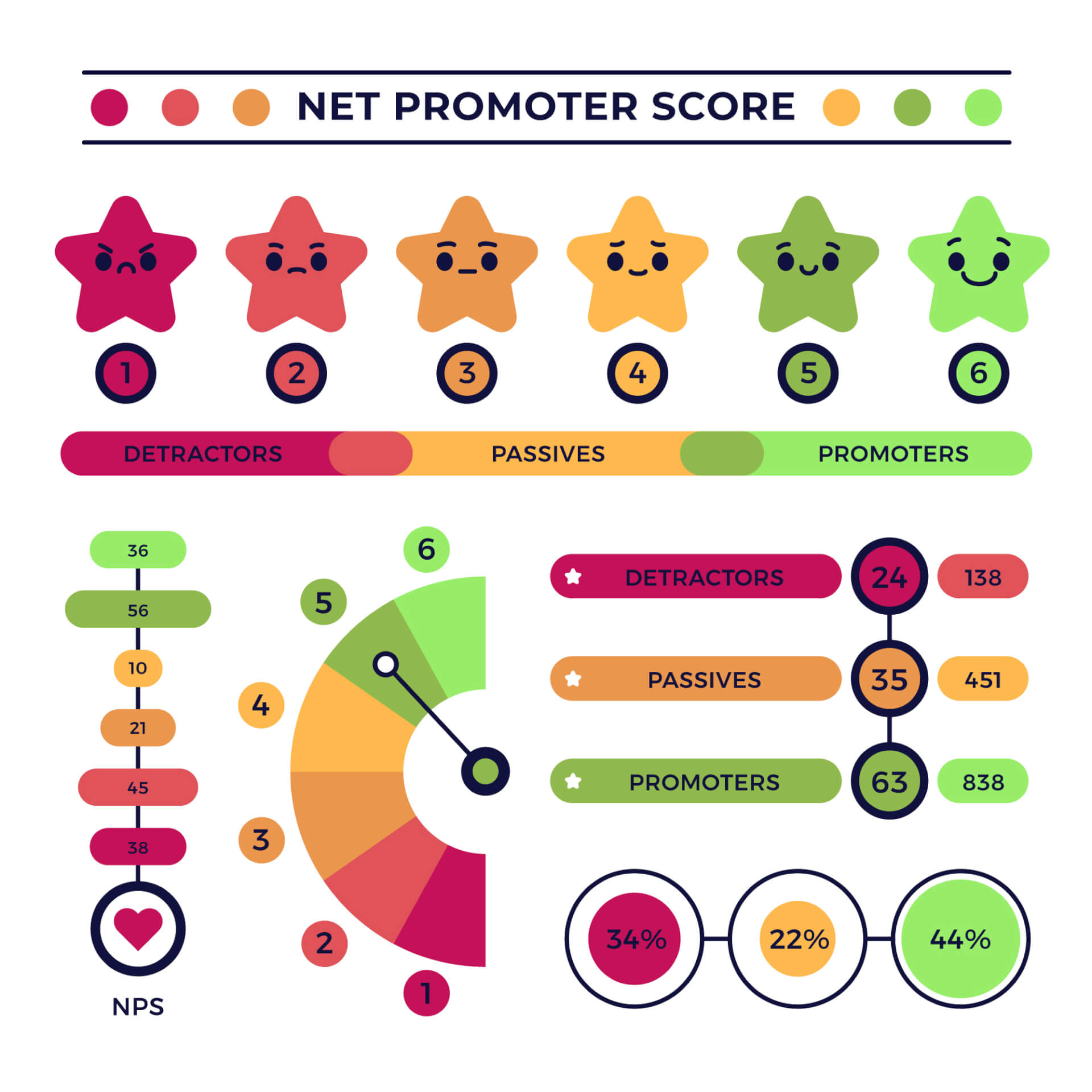The Net Promoter Score (NPS) is a key metric that helps businesses gauge customer sentiment and identify areas for improvement. It's not just a metric but a powerful tool that can transform your marketing strategy.
 So, how can you leverage NPS to boost your business? Let's dive in and find out. In this comprehensive guide, we'll delve into how you can leverage NPS results to enhance your marketing strategy and drive growth.
So, how can you leverage NPS to boost your business? Let's dive in and find out. In this comprehensive guide, we'll delve into how you can leverage NPS results to enhance your marketing strategy and drive growth.
Table of Contents
What is NPS?

If you are not familliar with the Net Promoter Score, how it is calculated and how the survey is structured, please have a closer look at our introduction article "The Net Promoter Score – basics and areas of application" before you continue reading.
In simple words, the NPS is calculated based on responses to a single question:
"How likely are you to recommend our product/service to a friend or colleague?"
Customers respond on a scale of 0 to 10, categorized as Promoters (9-10), Passives (7-8), and Detractors (0-6).
NPS Types and Categories
- Transactional NPS
Measures satisfaction after a specific interaction or transaction, such as a purchase or customer service interaction. - Relationship NPS
Evaluates overall customer loyalty and satisfaction over time, typically through periodic surveys. - Industry Benchmarks
Comparing NPS against industry standards provides context and helps identify areas of competitive advantage or weakness.
How to read NPS scores

- High NPS Scores
Indicate strong customer loyalty, satisfaction, and a higher likelihood of referrals and repeat business. - Low NPS Scores
Signal potential issues with product/service quality, customer service, or overall customer experience that need to be addressed.
- Promoters: These customers are your brand advocates. Engage them with exclusive offers and referral programs.
- Passives: While satisfied, these customers aren't enthusiastic. Identify ways to turn them into promoters.
- Detractors: Address their concerns promptly to improve their experience and reduce negative word-of-mouth.
Benefits of Using NPS in Marketing

Why should you use NPS in your marketing strategy? Here are some compelling reasons:
- Identifying Customer Loyalty: NPS helps you pinpoint your most loyal customers.
- Predicting Business Growth: There's a strong correlation between high NPS and revenue growth.
- Enhancing Customer Feedback: NPS provides actionable insights into customer satisfaction.
Implementing NPS in Your Marketing Strategy
 Now, let's talk implementation. Here's how to get started with NPS:
Now, let's talk implementation. Here's how to get started with NPS:
- Setting Up NPS Surveys: Keep your surveys short and to the point. Ask the crucial NPS question and follow up with open-ended questions for detailed feedback.
- Choosing the Right Time to Survey: Timing is everything. Send surveys after a purchase, following customer service interactions, or at regular intervals.
- Analyzing NPS Data: Look at both the score and the qualitative feedback to gain a comprehensive understanding.
Leveraging NPS for Product Development
NPS feedback can drive product innovation:
- Using Feedback for Product Improvements: Focus on common themes in detractor feedback.
- Prioritizing Development: Invest in features that will most likely increase your NPS.
NPS and Customer Experience (CX)

Integrating NPS with your customer experience strategy can enhance overall satisfaction:
- Enhancing CX with NPS Insights: Use NPS data to identify pain points in the customer journey.
- Integrating NPS into the Customer Journey: Collect feedback at critical touchpoints to continuously improve.
Common Mistakes to Avoid with NPS
Avoid these pitfalls to make the most of NPS:
- Misinterpreting NPS Data: Don’t just focus on the score; consider the feedback.
- Ignoring Feedback from Detractors: This is a valuable source of insights for improvement.
- Overlooking Passive Customers: They represent a significant opportunity for growth.
Conclusion
Incorporating the Net Promoter Score into your marketing strategy can provide deep insights into customer loyalty and satisfaction, helping you to drive growth and improve your products and services.
By integrating NPS into broader marketing strategies, businesses can cultivate stronger customer relationships and position themselves for long-term success in today's competitive landscape.
 Recommended reading: If this article helped you and you would like to learn more about the possibilities of using NPS in customer acquisition, continue reading here: "The role of NPS in customer acquisition"
Recommended reading: If this article helped you and you would like to learn more about the possibilities of using NPS in customer acquisition, continue reading here: "The role of NPS in customer acquisition"